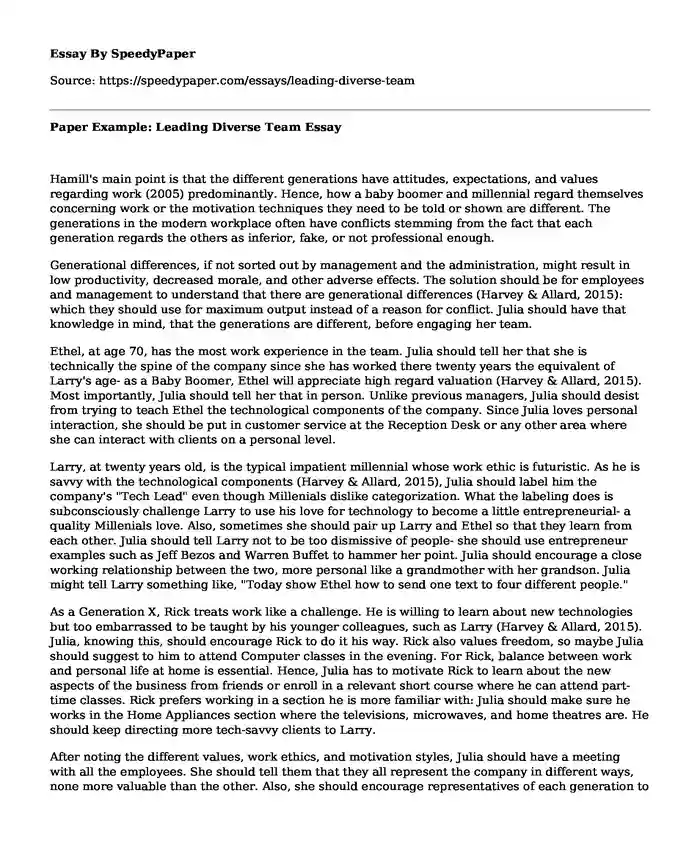
| Type of paper: | Course work |
| Categories: | Human resources Problem solving Organizational behavior Conflict management |
| Pages: | 3 |
| Wordcount: | 623 words |
Hamill's main point is that the different generations have attitudes, expectations, and values regarding work (2005) predominantly. Hence, how a baby boomer and millennial regard themselves concerning work or the motivation techniques they need to be told or shown are different. The generations in the modern workplace often have conflicts stemming from the fact that each generation regards the others as inferior, fake, or not professional enough.
Generational differences, if not sorted out by management and the administration, might result in low productivity, decreased morale, and other adverse effects. The solution should be for employees and management to understand that there are generational differences (Harvey & Allard, 2015): which they should use for maximum output instead of a reason for conflict. Julia should have that knowledge in mind, that the generations are different, before engaging her team.
Ethel, at age 70, has the most work experience in the team. Julia should tell her that she is technically the spine of the company since she has worked there twenty years the equivalent of Larry's age- as a Baby Boomer, Ethel will appreciate high regard valuation (Harvey & Allard, 2015). Most importantly, Julia should tell her that in person. Unlike previous managers, Julia should desist from trying to teach Ethel the technological components of the company. Since Julia loves personal interaction, she should be put in customer service at the Reception Desk or any other area where she can interact with clients on a personal level.
Larry, at twenty years old, is the typical impatient millennial whose work ethic is futuristic. As he is savvy with the technological components (Harvey & Allard, 2015), Julia should label him the company's "Tech Lead" even though Millenials dislike categorization. What the labeling does is subconsciously challenge Larry to use his love for technology to become a little entrepreneurial- a quality Millenials love. Also, sometimes she should pair up Larry and Ethel so that they learn from each other. Julia should tell Larry not to be too dismissive of people- she should use entrepreneur examples such as Jeff Bezos and Warren Buffet to hammer her point. Julia should encourage a close working relationship between the two, more personal like a grandmother with her grandson. Julia might tell Larry something like, "Today show Ethel how to send one text to four different people."
As a Generation X, Rick treats work like a challenge. He is willing to learn about new technologies but too embarrassed to be taught by his younger colleagues, such as Larry (Harvey & Allard, 2015). Julia, knowing this, should encourage Rick to do it his way. Rick also values freedom, so maybe Julia should suggest to him to attend Computer classes in the evening. For Rick, balance between work and personal life at home is essential. Hence, Julia has to motivate Rick to learn about the new aspects of the business from friends or enroll in a relevant short course where he can attend part-time classes. Rick prefers working in a section he is more familiar with: Julia should make sure he works in the Home Appliances section where the televisions, microwaves, and home theatres are. He should keep directing more tech-savvy clients to Larry.
After noting the different values, work ethics, and motivation styles, Julia should have a meeting with all the employees. She should tell them that they all represent the company in different ways, none more valuable than the other. Also, she should encourage representatives of each generation to contribute how the workplace might be made better formally. In that manner, Larry, Rick, and Ethel will have a better working relationship.
References
Hammill, G. (2005). Mixing and managing four generations of employees. FDU Magazine online, 12(2), 5-15.
Harvey, C. P., & Allard, M. (2015). Understanding and managing diversity: Readings, cases, and exercises. Pearson.
Cite this page
Paper Example: Leading Diverse Team. (2023, Feb 12). Retrieved from https://speedypaper.net/essays/leading-diverse-team
Request Removal
If you are the original author of this essay and no longer wish to have it published on the SpeedyPaper website, please click below to request its removal:
- Free Essay Sample: Incident Action Plan
- Essay Sample: Bilateral Treaty against Multilateral Treaty
- Essay Example: Work of Art from the Getty Villa and My Experience
- Essay Sample on Reflection of My Resume
- Essay Example on Stakeholder Analysis and the Case of Merck
- Paper Example: Computer System Performance and Workload Measurement.
- Free Essay. Sales and Purchasing Management
Popular categories




